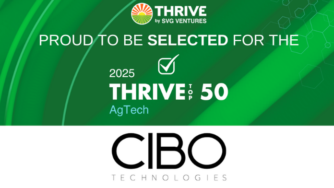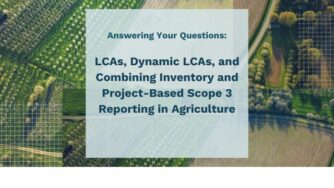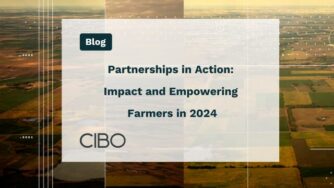Life Cycle Assessment (LCA) databases are useful tools for corporations to baseline and track their agricultural Scope 3 greenhouse gas emissions (GHGs). However, they are limited in their granularity and ability to track year-over-year change. In addition, they are often at the jurisdictional scale, which may be larger than a company’s supply shed. Companies that are ready to go beyond generating a coarse baseline number and start taking action to develop, deploy and deliver reporting on GHG-reducing interventions in their supply sheds need a solution that’s tailored to those needs.
CIBO Impact is a comprehensive, science-based platform helping corporations reduce and report on their agricultural Scope 3 emissions. With CIBO Impact, enterprises can:
- Define their sourcing regions and measure carbon intensity from their inventory base year to the current crop year
- Design a strategy to reduce emissions to reach their interim (5-10 year) agriculture GHG reduction targets
- Develop and deploy grower-facing programs to achieve these targets
- Deliver inventory and outcomes reporting
CIBO Impact is ideal for understanding the past, current and future cradle-to-farm-gate GHG outcomes of unique supply sheds and intervention programs, as well as designing and deploying those programs.
Here are four ways CIBO Impact enriches and goes beyond the traditional data that LCAs provide for farm-level emissions:
- Supply-Shed-Level Resolution: LCA databases provide carbon intensity (CI) insights at the state or national level, and typically lack granularity below this scale. CIBO fills this gap by providing CI at multiple levels, including national, state, county, field, or custom geographies and draw distances. CIBO users get accurate CI data for their specific supply shed, accounting for significant geographic CI differences that are overlooked when using LCA national or state-level averages.
- Dynamic Data for Year-over-Year Analysis: Traditional LCA databases offer static data that may not be updated on an annual basis in step with corporate reporting requirements. In contrast, CIBO leverages actual practice, weather and soil data on every field in the supply shed, enabling precise modeling year-to-year that meets corporate standards.1 This dynamic approach allows for accurate tracking of changes in CI over time, empowering stakeholders to make informed decisions based on current conditions.
- Validated Modeling for What-If Quantification: LCA databases lack the ability to predict how changes in field-level practices, like implementing cover-cropping or reduced tillage, could affect commodity CI over time. CIBO addresses this limitation by enabling stakeholders to accurately quantify the impact of agricultural practices on soil organic carbon or yield using CIBO’s ecosystem model, the Systems Approach for Land Use Sustainability (SALUS) with forward-looking weather data.
- Apples-to-Apples Comparison to Interventions: Different assumptions, emissions boundaries, and methodologies make it challenging to compare LCA carbon intensity to the modeled carbon intensity of interventions where farmer data has been collected. These comparisons are not “apples-to-apples” because intervention programs often use IPCC Tier 3 (sample or model-based) approaches for measuring yield and soil carbon, and therefore could result in an inaccurate portrayal of the effectiveness of an intervention – possibly even making it appear that an intervention had no effect. Using the CIBO quantification approach for a supply shed eliminates this bias and enables an apples-to-apples comparison of CI when we have farmer data for interventions.
CIBO Impact delivers benefits that LCAs cannot by offering supply-shed resolution at any scale; year-over-year data; validated modeling; and effective comparison of supply sheds and interventions. By addressing the limitations of traditional LCA databases, CIBO Impact empowers stakeholders to make more informed decisions and drive positive environmental change at scale.
Contact us to see a demo.
- Such as the Greenhouse Gas Protocol Land Sector and Removals Guidance (GHGP LSRG) or the Science Based Targets Initiative’s Food, Land, And Agriculture Guidelines (SBTi FLAG).



